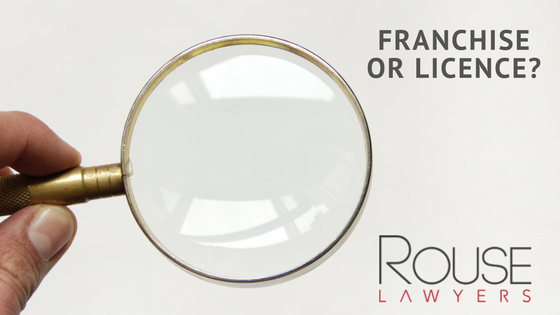
This Article was previously published in the July/August print edition of Franchise Business Magazine.
If it looks like a duck, walks like a duck and quacks like a duck, it probably is a duck. The same reasoning can be applied to whether a licence agreement constitutes a franchise agreement – it is a matter of substance over form.
Both licence agreements and franchise agreements can grant people the right to use intellectual property, including trademarks, brands and a business system.
There are differences between the two types of agreement, so if you are thinking of buying into a franchise you need to make sure of your ground. Under the Australian Franchising Code of Conduct, four elements must be met for an agreement to constitute a franchise agreement…
- There is an agreement, either written, oral or implied
- One person grants to another person the right to conduct a business offering, supplying or distributing goods or services under a system or marketing plan substantially determined, controlled or suggested by the franchisor
- The business will be substantially or materially associated with a trademark, advertising or a commercial symbol owned, used or licensed by the franchisor or specified by the franchisor
- Before starting (or continuing) the business, the franchisee must pay or agree to pay the franchisor a fee. The fee can include an initial capital investment, payment for goods or services, or a royalty fee. It excludes payments for goods or services supplied on a genuine wholesale basis or repayment of a loan.
All four elements are cumulative – in other words, all elements and all parts of each element must be present before the agreement can be classified as a franchise agreement. It does not matter what the agreement is called. If it meets all four criteria, it will constitute a franchise agreement for the purposes of the code. The main factor distinguishing a licence agreement from a franchise agreement is the degree of control and strict compliance with a business system inherent to franchise agreements. Licence agreements are commonly more relaxed in this regard.
CASE STUDY
The leading case relative to this area was the 2012 Federal Court decision in Rafferty v Madgwicks. In finding that a “rights agreement” was in fact a franchise agreement, the court set out relevant factors that could potentially indicate the existence of a franchise agreement.
These included:
- Specific requirements for accounting and record-keeping, signage and merchandising, sales structures and reporting turnover
- The franchisor’s right to audit account records and to approve marketing material
- Restrictions on thefranchisee’s sale of competing products or services, use of the brand name and trademarks, and specific marketing or sales territories. For the document to constitute a franchise agreement, the system or marketing plan under the agreement must be substantially determined, controlled or suggested by the franchisor. The degree of control must be carefully considered, along with the extent to which the franchisee’s business involves the sale of the franchisor’s goods or services.
The details of such a system or marketing plan do not need to be set out in the agreement. It will be enough for the business to be proved a franchise if the agreement allows the franchisor to exercise this control.
Just because an agreement is not called or intended to be a franchise agreement, it may nevertheless be caught within the ambit of the code, which is intended to protect franchisees involved in transactions where there is inequality of bargaining power. Therefore it is important to look at the substance of an agreement to determine whether it will be governed by the code. Heavy obligations are placed on both parties under the code, as well as consequences for non-compliance. This makes it essential to always obtain legal advice before entering into commercial agreements to ensure full compliance with the relevant laws.
Need advice about your Franchise Agreement? Talk to the Franchising team at Rouse Lawyers. Contact us today!
